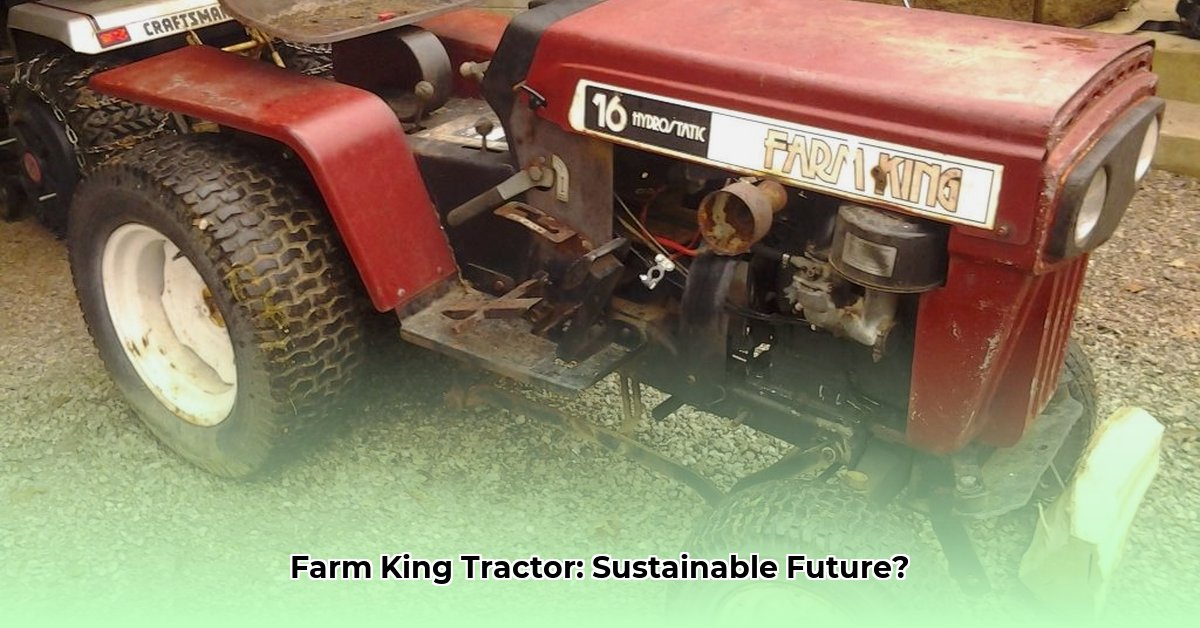
Choosing the right tractor is a pivotal decision for any farmer, especially those committed to sustainable agriculture. This in-depth review compares Farm King tractors to RK Tractors, analyzing their features, costs, and environmental impact to help you make an informed choice. We'll delve into fuel efficiency, maintenance, and long-term sustainability, providing actionable intelligence to guide your investment. For a deeper understanding of tractor classification, see this helpful resource.
Defining "Sustainable Tractor"
Before comparing specific models, it's crucial to define what constitutes a truly sustainable tractor. It's more than just eco-friendly paint; it encompasses several key factors: fuel efficiency, minimal soil compaction, durability (reducing replacement needs), and responsible manufacturing and end-of-life considerations. The goal is to minimize the overall environmental footprint throughout the tractor's lifecycle. Isn't minimizing the environmental impact of your operations a top priority?
Farm King Tractors: A Deep Dive
Farm King tractors are recognized for their robust build and powerful performance. Features like the Dual Rotary Rake highlight their efficiency in tasks like hay harvesting. However, to assess their sustainability, we need concrete data. How do their fuel efficiency and maintenance costs compare to competitors? Do they truly minimize long-term environmental impact? These are the key questions. The lack of readily available data on these points makes definitive conclusions challenging.
RK Tractors: A Comparative Analysis
RK Tractors present a strong competitive alternative. Standard features like upgraded seats and improved lighting enhance operator comfort and productivity. Extended warranties minimize downtime, crucial for maintaining workflow and reducing potentially costly repairs. However, RK Tractors typically command a higher initial price point than Farm King. Is the premium justified by the enhanced features and reduced repair risk? This needs further investigation.
Total Cost of Ownership (TCO): Beyond the Sticker Price
The true sustainability of a tractor extends beyond horsepower to encompass its total cost of ownership (TCO). TCO considers the initial purchase price, fuel consumption, routine maintenance, unexpected repairs, and eventual resale value. A comprehensive TCO analysis for both Farm King and RK is currently lacking, hindering a truly informed decision-making process. This lack of transparency from manufacturers is a significant concern.
Don't underestimate the importance of TCO. A seemingly less expensive tractor might prove more costly in the long run due to higher fuel consumption or frequent repairs. How can farmers accurately weigh these factors without transparent data from manufacturers? This is a critical consideration for sustainable farming practices. Detailed TCO data is crucial!
Key Data Gaps and the Need for Transparency
To perform a truly objective comparison, we need detailed, manufacturer-provided data on fuel consumption, maintenance intervals, part lifespan, repair costs and expected resale value for both Farm King and RK Tractors. Without this crucial information, any assessment remains incomplete and potentially misleading. We urge manufacturers to prioritize transparency to empower farmers with the data they need for confident purchasing decisions. The lack of readily available information is a significant barrier to informed decision-making.
Actionable Steps for Informed Tractor Purchasing
Comprehensive Research: Go beyond marketing brochures. Seek independent reviews, consult with fellow farmers who own these tractors, and actively search for detailed specifications on fuel economy, maintenance schedules, and potential repair costs for both Farm King and RK Tractors.
Explore Financing Options: Research available loans, leasing arrangements, and government incentives designed to support farmers investing in sustainable equipment. This can significantly influence your overall TCO.
Long-Term Perspective: Don't focus solely on the initial price. Consider long-term running costs, fuel efficiency, and environmental impact. A slightly more expensive tractor might ultimately prove more economical and environmentally friendly over its lifespan.
Risk Assessment: Potential Challenges
| Risk Category | Potential Risk | Mitigation Strategies |
|---|---|---|
| High Initial Cost | Exceeding initial budget. | Thorough budgeting, exploring financing options, comparing prices. |
| Unexpected Repairs | Unforeseen and costly repairs. | Extended warranties, careful review of reliability reports. |
| Technological Obsolescence | Rapid technological advancements rendering the tractor outdated. | Consider the pace of technological change, choose a model with a longer projected lifespan. |
| Part Availability | Difficulty sourcing necessary parts for repairs. | Research the manufacturer's parts distribution network, consider purchasing common parts proactively. |
The Verdict: The Need for More Information Remains
While both Farm King and RK Tractors offer features that could potentially support sustainable farming, a definitive conclusion remains elusive due to the insufficient data available. Greater transparency from manufacturers is urgently needed to allow farmers to make well-informed decisions. Until then, thorough and persistent research is paramount.
"The lack of transparency hampers informed decision-making for sustainable agriculture," states Dr. Emily Carter, Professor of Agricultural Engineering at the University of Illinois. "Farmers depend on reliable data to optimize their investments and minimize environmental impact. Manufacturers must prioritize open and accessible information."
Calculating Total Cost of Ownership (TCO) for Sustainable Farm Equipment
Understanding TCO is essential. It's not just the purchase price; it's the sum total of all expenses throughout the tractor's useful life. Precise TCO calculations require detailed record-keeping of all expenses. Spreadsheet software is ideal. Tracking every cost associated with the tractor will help in making a transparent and informed decision.